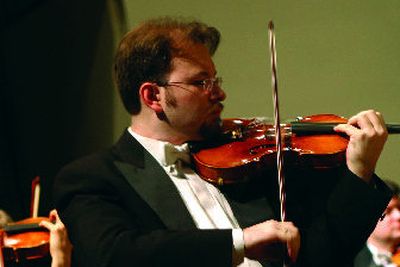‘You are your own destiny’

Spokane may not appear to be as much of a cultural melting pot as places like New York, but the city does enjoy having pockets of immigrants, most of whose hard work and talents enrich our life in many different ways. One of those talents prominently in the public eyes is Matuesz Wolski, who joined the Spokane Symphony Orchestra last fall as concert master.
Born in 1975 in Warsaw, Poland, Wolski grew up at the crossroad between the height of communism and the beginning of the end of an era. He remembers what life was like coming of age during that transition time. “The smell of the place, the looks on people’s face, I remember them as very much broken,” he said.
He recalled standing in long lines as a boy with his mother waiting to buy rations of basic supplies like bread and cooking oil. There was one incident that he will never forget. When he was around 3, somehow the family came into the fortune of some bananas, but He did not like the taste of banana and would not eat it. The parents were aghast. “How could you not like bananas? How could you not?” they demanded. “How could I like bananas?” Wolski asked rhetorically today. “I had never seen bananas before! It was a foreign object to me!”
Although impoverished like others then, poverty provided a fertile intellectual ground for young Wolski to grow up on. His father, a prominent writer today with scores of successful books under his name, was active in the Solidarity movement. Many nights, the family would huddle around the kitchen table with friends, debating politics or tuning in to Radio Free Europe and Voice of America, cleverly out-maneuvering government censors to catch glimpses of what was really happening in the their own country and the world.
At that time, every 7-year-old child in Warsaw was given a chance for an audition to the local music school. Hoping to improve his dexterity, Wolski’s mother brought him for an audition to the local primary music school and he was assigned to learn violin, a terrible disappointment to the youngster as he wanted to learn piano instead. But through the years he excelled and became active in the chamber music scene in Warsaw at a time the country was going through rapid transformation since the fall of Berlin Wall in 1989.
Music, a symbol of high culture and Western civilization, enjoyed a glorious renaissance as Wolski himself was maturing both as a musician and as a young man. At 21, he joined a successful string quartet that came to New York for the Young Concert Artist competition. Although the group did not win any prize, all members were offered a full scholarship by Manhattan School of Music.
Wolski studied under Glenn Dicterow, the concert master of the New York Philharmonic. “While I took one full year of intense English in Columbia University to learn my way around!” Wolski said in his fluent English today. Before accepting the offer to the concert master’s position in Spokane, he performed with New York Philharmonic at Carnegie Hall, and all over Europe as a soloist and ensemble artist.
Asked what he likes most about America, Wolski explained: “I love the feeling that if you apply yourself seriously to anything, there are no external factors that can limit you. There is no government that can stop your hard work and efforts. You are your own destiny,” he said. “In a way this is a frightening way to live because you have to take the ownership of your failure as well. But this is also an honest way to live. You are forced to excel. It tests your limit.”
He said he enjoys Spokane for its clean air and the proximity to everything from wilderness to big-city cultural events.
“In Spokane, you can still stop and enjoy the scenery for a moment,” he said. “For a city this size, there is also a wide array of cultural venues. You have a sense of big city in a small town, culturally speaking.”